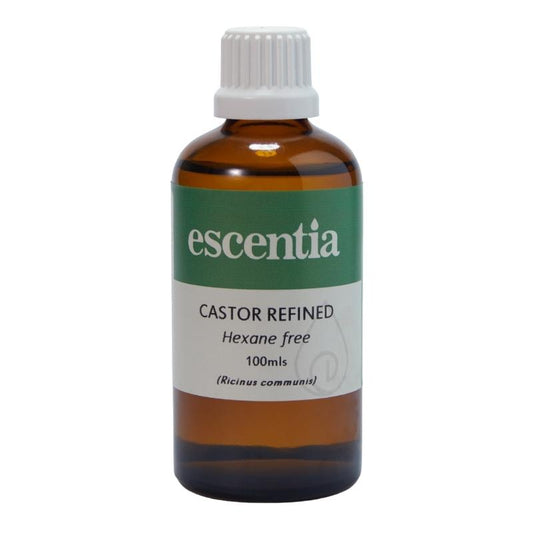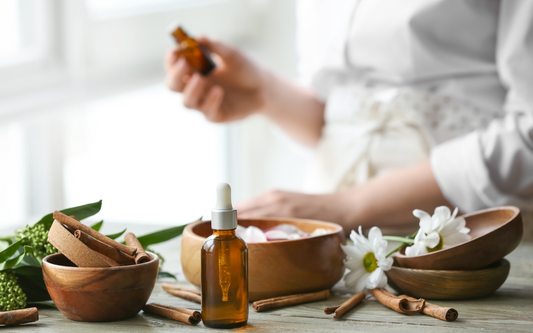
What's All the Fuss About Castor Oil?
Aiden Van WykIn the realm of natural remedies and beauty products, one ingredient has seen a massive resurgence in popularity: humble castor oil.
I have unpleasant early memories of my grandmother using it to treat all manner of ailments - the threat of a teaspoon, was usually enough for me to claim I was miraculously cured of whatever I had been complaining about because it tastes so bad. Perhaps that was her intention after all!
My emotional scars aside, castor oil has been used for centuries for its myriad of benefits - some proven and some anecdotal. But what exactly is all the fuss about?
What is Castor Oil?
Castor oil is a vegetable oil extracted from the seeds of the castor bean plant, scientifically known as Ricinus communis and also known as Ricinus oil or Oleum Ricini. Unlike its Latin name might suggest, castor oil does not contain ricin, the natural poison found in the plant.
Castor oil has been utilised for various purposes throughout history. The process of cold pressing, which extracts oil from castor bean seeds without using heat or chemicals, helps maintain the oil's natural properties and nutrients. (Another variation, Jamaican Black Castor Oil, involves roasting the beans before pressing, resulting in a darker oil with a distinctive nutty aroma.)
Is Hexane Toxic?
Hexane, a chemical solvent commonly used in oil extraction, can leave behind harmful residues that pose health risks due to its neurotoxic and potential carcinogenic properties. By opting for hexane-free castor oil, you can ensure a safer extraction process that is devoid of these harmful solvents.
Castor Oil Uses And Benefits
The uses of castor oil span across various industries and applications.
Castor Oil In Health
- Castor oil is FDA-approved as a laxative. Ricinoleic acid attaches to receptors in the intestines, stimulating muscle contractions and aiding in bowel function.
- Additionally, castor oil has been found to have anti-inflammatory properties, making it useful for wound care and joint pain relief. Some studies even suggest its effectiveness in treating osteoarthritis and joint pain when used topically.
Castor Oil In Skincare, Haircare and General Products
- It's commonly used in toiletries and cosmetics due to its moisturising properties. Ricinoleic acid, a monounsaturated fatty acid found in castor oil, is an renown moisturiser for dry, damaged, or chapped skin.
- Castor oil imparts a rich and slightly sticky texture, making it ideal for lip products - it's often used in lipsticks and lip glosses.
- Castor oil is used in oil cleansers due to its moisturising and barrier functions.
- Its humectant and antifungal properties make it a popular ingredient in shampoos and hair care formulations, where it helps nourish the scalp and promote healthy hair growth.
- While in cleaning, it can be combined with other ingredients to create effective all-purpose cleaners, leather polishes, and rust preventatives.
Castor oil's versatility and multitude of benefits should make it a staple in households and beauty regimens. It has stood the test of time for good reason and it's an inexpensive natural resource.
Is More research needed?
User reviews provide valuable insights into the effectiveness and benefits of castor oil. Customers praise the oils for their moisturising properties, with many noting improvements in skin hydration and hair texture after regular use.
Although further research is needed to substantiate claims, here are some of the ways castor is being used:
Scalp and hair treatments:
Castor oil is often used as a scalp treatment to promote hair growth and improve hair health. It's sometimes mixed with other oils or ingredients like coconut oil, olive oil, or essential oils for added benefits. Applying castor oil to the scalp and hair is said to help nourish the follicles, moisturise the scalp, and strengthen the hair shaft.
Eyelash and eyebrow growth:
One of the more popular unconventional uses of castor oil is for promoting eyelash and eyebrow growth. A small amount of castor oil applied to lashes and brows before bed is said to help them grow longer, thicker, and stronger over time.
Belly button massage:
In some cultures, massaging the belly button with oils like castor oil is believed to have various health benefits. This practice is thought to help improve digestion, alleviate menstrual cramps, and even promote fertility.
Cuticle care:
Castor oil's moisturising and nourishing properties have made it a recommended choice for cuticle care. Massaging a small amount of castor oil into the cuticles can help soften and hydrate them, making them less prone to dryness and cracking.
Lip care:
Castor oil is often used in lip balms and glosses for its moisturising and protective properties. Some people also apply a small amount of castor oil directly to their lips to keep them soft, smooth, and hydrated.
DIY beauty recipes:
From face masks to body scrubs, castor oil is incorporated into a wide range of DIY beauty recipes and is sometimes mixed with ingredients including, honey, yogurt, or clay to create custom skincare treatments
While these uses may seem unconventional, many swear by the benefits of incorporating castor oil into their beauty and wellness routines.
Cautionary notes
Pregnant and nursing women, as well as individuals taking prescription drugs, should consult a medical professional before use. Large quantities taken orally may cause nausea, vomiting, and colic, although sensitivity to castor oil is rare.
As with any new skincare or haircare product, it's essential to patch test first and consult with a dermatologist if you have any concerns.
















